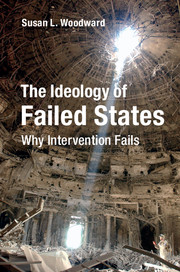Crossref Citations
This Book has been
cited by the following publications. This list is generated based on data provided by Crossref.
Grosser, Pierre
2017.
En quête d’alternatives.
p.
237.
2017.
Books Received.
American Journal of International Law,
Vol. 111,
Issue. 3,
p.
823.
Ciorciari, John D.
and
Krasner, Stephen D.
2018.
Contracting Out, Legitimacy, and State Building.
Journal of Intervention and Statebuilding,
Vol. 12,
Issue. 4,
p.
484.
Pugh, Michael
2018.
Precarity in Post-Conflict Yugoslavia: What About the Workers?.
Civil Wars,
Vol. 20,
Issue. 2,
p.
151.
Lebow, Richard Ned
2018.
The Rise and Fall of Political Orders.
Meyers, Reinhard
2019.
Handbuch Frieden.
p.
1.
Carnegie, Allison
Howe, Kimberly
Lichtenheld, Adam
and
Mukhopadyay, Dipali
2019.
The Effects of Foreign Aid on Rebel Governance: Evidence from a Large-Scale U.S. Aid Program in Syria.
SSRN Electronic Journal,
Kühn, Florian P.
2019.
Normative Scaling and Crisis Knowledge: The Problematic Use of Selective Analogies to Compare Conflicts.
Civil Wars,
Vol. 21,
Issue. 4,
p.
569.
Marks, Michael P.
2019.
Metaphor, Nation and Discourse.
Vol. 82,
Issue. ,
p.
35.
Curtis, Devon E. A.
2019.
What Is Our Research For? Responsibility, Humility and the Production of Knowledge about Burundi.
Africa Spectrum,
Vol. 54,
Issue. 1,
p.
4.
Clausen, Maria-Louise
2019.
Justifying military intervention: Yemen as a failed state.
Third World Quarterly,
Vol. 40,
Issue. 3,
p.
488.
Connell, John
and
Aldrich, Robert
2020.
The Ends of Empire.
p.
371.
2020.
Foundations of Comparative Politics.
p.
13.
Zeigermann, Ulrike
2020.
Policy Coherence for Sustainable Development – A Promising Approach for Human Security in Fragile States?.
Journal of Peacebuilding & Development,
Vol. 15,
Issue. 3,
p.
282.
Belloni, Roberto
2020.
The Rise and Fall of Peacebuilding in the Balkans.
p.
109.
Phillips, Sarah G.
2020.
The primacy of domestic politics and the reproduction of poverty and insecurity.
Australian Journal of International Affairs,
Vol. 74,
Issue. 2,
p.
147.
Richmond, Oliver P.
and
Tellidis, Ioannis
2020.
Analogue crisis, digital renewal? Current dilemmas of peacebuilding.
Globalizations,
Vol. 17,
Issue. 6,
p.
935.
2020.
Foundations of Comparative Politics.
p.
15.
Matusitz, Jonathan
2020.
Global Jihad in Muslim and non-Muslim Contexts.
p.
233.
Peterson, Gregory R.
2020.
Beyond the two cultures: Democratic virtues and the case for a model of mutuality.
Administrative Theory & Praxis,
Vol. 42,
Issue. 3,
p.
279.



